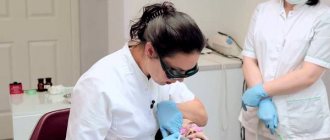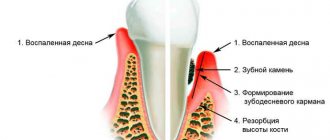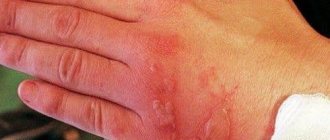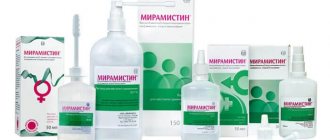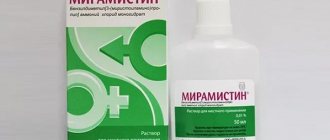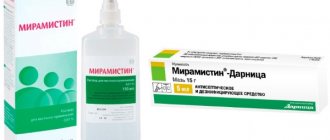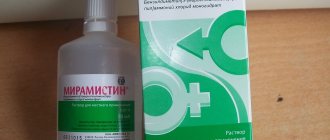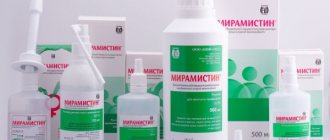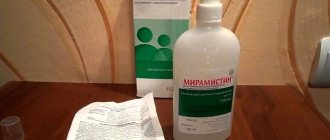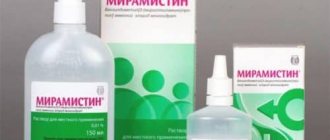Finding an effective medicine that can quickly eliminate the symptoms of inflammation of the oral mucosa is quite difficult. Such a drug should have an effect on the maximum number of pathogens and cause minimal damage to the body. Miramistin is very close to this ideal: for stomatitis, it can be prescribed to patients regardless of age and optimal treatment regimens can be selected for each person.
Composition and release form of the drug
Miramistin is a local antiseptic. The main active component of this substance is miramistin, of which the solution contains 0.1 milligrams. The excipient is distilled water. Analogue of Chlorhexidine for stomatitis.
The drug has several forms of release: a solution for rinsing, a gel, an ointment for application to affected surfaces, and a spray for treating mucous membranes. Available in pharmacies without a prescription.
The most convenient form of release of this drug is a spray. It covers the mucous membrane well and easily reaches even hard-to-reach areas, which cannot be said about ointment or gel. Its only drawback is the restriction on age groups - the spray can only be used for persons over 4 years old.
What antiseptics should you not rinse your mouth with?
In such cases, you should never resort to using hydrogen peroxide. Treatment of gums with this substance is possible, but only at a dentist’s appointment. Moreover, this is done exclusively as part of a complex treatment, and not in the form of a primary remedy. Peroxide is used to wash periodontal points.
This procedure cannot be performed independently at home, and any attempts may end in failure. So rinsing your mouth with hydrogen peroxide is completely useless. During such rinsing, the peroxide does not really get on the affected gum, but only washes the mucous membrane. In addition to this, diluted peroxide is completely ineffective. Its concentration should be three percent.
Properties
Miramistin is an antiseptic disinfectant intended for external use. The active substance of the drug affects the lipids of the membranes of microorganisms, which leads to fragmentation and further destruction of cells. The drug is effective against gram-positive and gram-negative bacteria, aerobic and anaerobic microorganisms, as well as asporogenic and spore-forming microbes.
Unlike other antiseptics, Miramistin selectively affects bacteria; it practically does not affect the cells of the human body. For this reason, it is considered a safer drug than its analogues and can be used for patients of various age groups.
Literature
1. Ivanov BC Periodontal diseases. M, 2001.
2. Kopeikin V.N. Orthopedic treatment of periodontal diseases. M, 1998.
3. Kudryavtseva T.V., Orekhova L.Yu., Grudyanov A.I. Organization of periodontal care. – Periodontology, 2001,1-2,7-8.
4. Kuryakina N.V., Kutepova T.F. Periodontal diseases. Novgorod, 2000.
5. Pinegin B.V., Andronova T.M. Some theoretical and practical issues of clinical use of the immunomodulator Lycopid. – Immunology, 1998,2,60-63.
6. Svistov V.V. Miramistin® is a domestic antiseptic with a wide spectrum of action. – Military Medical Journal, 1998,5,57-59.
Indications and contraindications
Without treatment, herpetic stomatitis can become chronic.
Miramistin is prescribed to patients with bacterial and herpetic stomatitis, as well as with a fungal type of infection of the mucous membrane in children under one year of age. Can be used as part of general therapy to treat allergic forms of the disease.
The only contraindication to the use of such a drug is individual sensitivity to its active substance. The drug has no restrictions on use by pregnant and lactating mothers, since it is not absorbed into the systemic circulation. Also, unlike other antiseptics, it can be used for children from the moment of birth. Details about the treatment method for stomatitis in pregnant women are here.
Scope of application
In dentistry, Miramistin is used for the prevention and treatment of inflammatory processes in the oral cavity, which can be caused by the following diseases:
Since the drug has no side effects, it is allowed to be used even for the treatment of pregnant women. It is only noticed that sometimes a slight burning sensation may appear in the mouth. After a few seconds it goes away. This effect does not require discontinuation of the drug.
To effectively treat gum disease, it is important to remove all deposits on the teeth. Then a rinse with Miramistin and a course of antibiotics are prescribed.
Instructions for taking the drug
To treat stomatitis, Miramistin is used in the form of a spray, rinse solution, and gel. The first version of the medicine is applied to the affected areas up to 4 times a day. The second form is used for rinsing by people of different age groups. The third is used for applications. It is applied to the affected areas of the mucous membrane and left there for 15 minutes so that the active components of the medicine can act on the bacteria or fungi that caused the inflammatory process. More information about sprays for stomatitis below.
The use of the drug in various age groups is always combined with treatment with antibiotics or antifungal drugs. Miramistin is not used as an independent remedy, since it cannot eliminate an infection localized in neighboring cavities (for example, when stomatitis develops against the background of sinusitis or sinusitis).
Despite the fact that the drug is available without a prescription, before using it you must consult a doctor, agree on the duration of treatment, the type of drug and the schedule for using Miramistin. This is the only way to achieve a lasting therapeutic effect when using it.
For adults
For the treatment of adults, the drug is used in two main forms:
- in the form of a solution. Rinsing is carried out using undiluted product; the mouth is rinsed with it up to 4 times a day. The course of treatment is 7 days;
- in the form of a spray. This remedy is applied to the oral mucosa 3-4 times a day. Spray it onto the affected areas with 2-3 pumps. The duration of treatment in this way is 3-10 days, depending on the degree of tissue damage.
The spray is effective in eliminating localized ulcers.
To enhance the effectiveness of the medicine, persons over 14 years of age are recommended to treat the affected areas with a soda solution before applying the spray to the mucous membranes or before gargling. To prepare it, dissolve a teaspoon of soda in a glass of warm water. The solution is used to treat the mucous membrane before each rinse.
For children
To treat mucous membranes in children under 4 years of age, Miramistin can be used in the form of ointments and gels. To do this, you need to take a cotton swab, collect a small amount of gel on it and apply it to the affected mucous membrane. It is better to do this after eating. It will be possible to give the child something to drink and eat again only half an hour after treating the throat.
Children over 4 years old can treat the mucous membrane with a spray. It is enough to apply it to the affected areas with a single press on the bottle. When using the spray, you need to make sure that the medicine does not get on the child’s tonsils or the back of the throat.
You can also use a rinse solution for people over 4 years of age. It should be used up to 4 times a day. The duration of treatment with the drug is determined individually for each child, but it rarely exceeds 10 days. More information about how to rinse your mouth for stomatitis here.
A gel based on Miramistin is considered a more effective remedy for children. This is due to the fact that ointment with the same substance is washed off faster with saliva and has a less pronounced therapeutic effect.
Briefly about stomatitis: types, symptoms
There are many types of stomatitis:
To effectively cope with stomatitis, it is important to determine its type and prescribe appropriate treatment.
The onset of the disease will be indicated by the following symptoms:
- part of the mucous membrane in the mouth turns red, ulcers or erosions appear on it, causing pain;
- breath has lost its freshness;
- more saliva began to be released;
- gums began to bleed;
- the lymph nodes closest to the mouth have enlarged;
- pain occurs when talking and eating;
- the temperature rose greatly.
Read also: Nimesil for gum inflammation
Who is at greater risk of getting sick?
In most cases, children from 0 to 3 years old suffer from stomatitis. This is due to several factors:
- Children's immunity has not yet been fully formed;
- they are more susceptible to infection;
- children often violate hygiene standards, as children prefer to explore the environment through their mouths, they lick and chew toys, objects that come to hand, door handles, etc.;
- and during teething the situation gets worse.
Separately, it should be said about candidal stomatitis. It often affects children who are breastfed. The cause of this species is the Candida fungus. It can be transmitted from the mother through milk.
Preparation and rules for using rinse solution
For adults, use ready-made Miramistin solutions for rinsing. A special product is prepared only for children over one year old. To prepare it, take equal quantities of water and Miramistin, mix until smooth and use for rinsing. The dosage of the drug is determined according to the age of the child:
- for persons under 6 years of age there will be no more than 6 ml of product;
- from 6 to 12 years – up to 10 ml;
- from 12 and older – up to 15 ml.
The dosage of the drug presented for children must be agreed with a doctor. You cannot arbitrarily increase or decrease the recommended doses, relying on the child’s appearance, well-being, and susceptibility to the medicine. This may reduce the effectiveness of therapy.
During pregnancy
There are no restrictions during pregnancy regarding the use of Miramistin. But to prevent an allergic reaction, a hypersensitivity test is performed before using it. To do this, apply a few drops of the solution to the skin in the wrist area (where the pulse can be measured) and rub thoroughly.
If no allergic reaction occurs within 10-15 minutes (inflammation, redness, blistering, rash), then Miramistin can be used according to the instructions for use.
During lactation, the use of Miramistin is also allowed.
Side effects
In children and adult patients with individual sensitivity to this drug during its
use, side effects may occur. These may be: itching, the appearance of a rash on the mucous membrane, a burning sensation in the mouth. Less commonly observed is a rash on the skin near the mouth, a burning sensation in the throat, and dermatitis.
If you experience such problems during treatment with Miramistin, consult your doctor about this issue. He may recommend that you continue treatment with this drug if allergic reactions are mild, or change it to another drug if the patient has a severe allergy to the drug.
How does Miramistin “work”?
Miramistin is an antiseptic drug that exhibits antiviral, antibacterial and antifungal effects.
Thanks to this medicine:
- strengthens local immune defense;
- prevents infection from spreading to healthy tissue;
- adsorbs (collects) pus;
- accelerates the restoration of damaged tissues;
- removes (washes away during sanitation) waste products of bacteria;
- acts as an anti-inflammatory agent.
E. O. Komarovsky is quite categorical about the drug Miramistin, and believes that the drug can provoke an allergic reaction. Especially if during rinsing the solution gets into the nasal passages.
Analogs
If for some reason the patient cannot use Miramistin for treatment, he can use analogues to treat the oral cavity. These are considered:
- external remedy Gorosten. Available in bottles of 30, 100, 400 milliliters. It is a colorless liquid with a lemon odor. It is not recommended to use this remedy for the treatment of small children;
- alcohol solution for external use Antifungin. It is a colorless substance with a distinct odor of alcohol. Used to treat fungal and bacterial types of stomatitis;
- alcoholic and aqueous solutions of Decamethoxin. Available in packs of 100 milliliters. It is a colorless substance used to treat skin, mucous membranes, and lacerations.
The presented products, although they are analogues of Miramistin, should not be used by patients instead of this drug without a doctor’s recommendation. This may negatively affect the effectiveness of the entire course of treatment.
Gum diseases
Loose teeth, painful gums and bad breath are just some of the unpleasant symptoms of gum disease.
The most common diseases are periodontal disease. periodontitis and gingivitis. the clinical picture of which allows them to be classified as one group of diseases. Usually the reason for going to the dentist is toothache, but the almost painless chronic course that some diseases of the teeth and gums take only complicates the situation and can lead to the loss of healthy teeth. This is why it is recommended to visit the dentist at least twice a year. Gum diseases in children at an early age significantly affect the formation of permanent dentition. Thus, new teeth are embedded in the gums, which, even when they appear, can be affected by caries. These children require regular dental care.
Inflammation of the gums does not go away without a trace and is accompanied by a number of symptoms characteristic of one or another form of the disease. Thus, periodontitis is an inflammation of periodontal tissues, which is a consequence of careless dental care, poor-quality treatment or dental prosthetics. With periodontitis, the gums become inflamed and lose their ability to hold the tooth in the jaw bed.
Miramistin® has a wide spectrum of antimicrobial activity, which allows you to effectively fight bacteria, fungi and viruses that affect the mucous membrane. Thanks to this, the drug is used in pediatric dentistry in the treatment of stomatitis and other oral lesions of bacterial or fungal origin.
In cases of severe inflammation, bleeding and sensitivity of the gums, as well as after dental treatment, installation of dentures or implants on damaged mucous membranes, it is necessary to apply Miramistin®, which will help relieve inflammation and prevent the development of infection. In addition, Miramistin, as a broad-spectrum antiseptic, is successfully used for dental implantation and prosthetics (removable and fixed dentures, clasp prosthetics), and for fungal infections of the oral mucosa (stomatitis in children).
Thus, thanks to the special formula of the drug, treatment of gum diseases with Miramistin is effective for inflammatory diseases of various etiologies.
